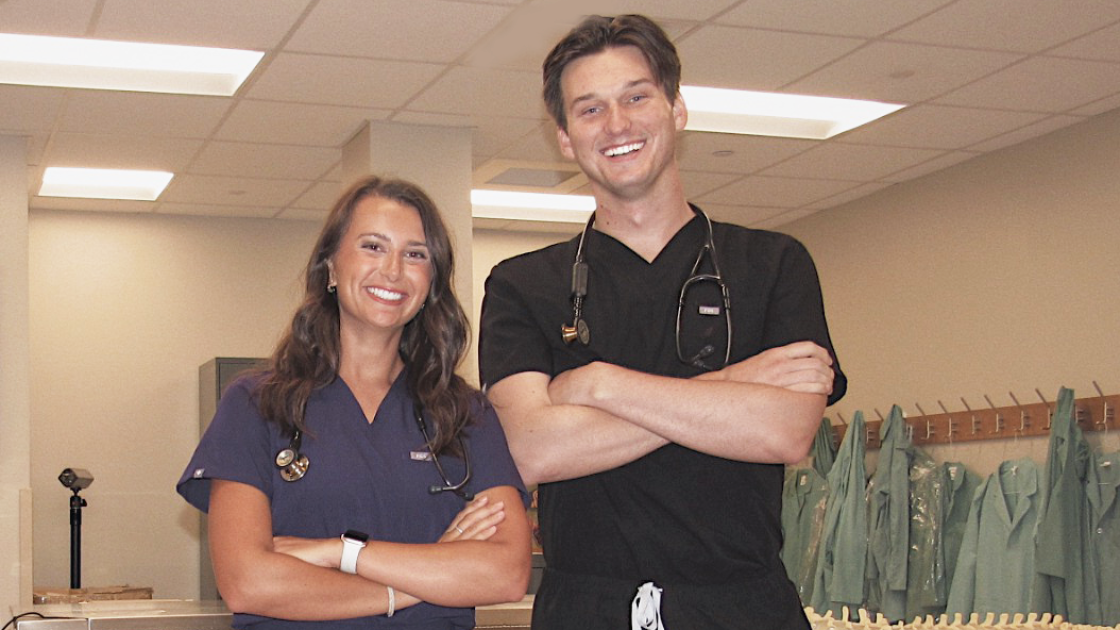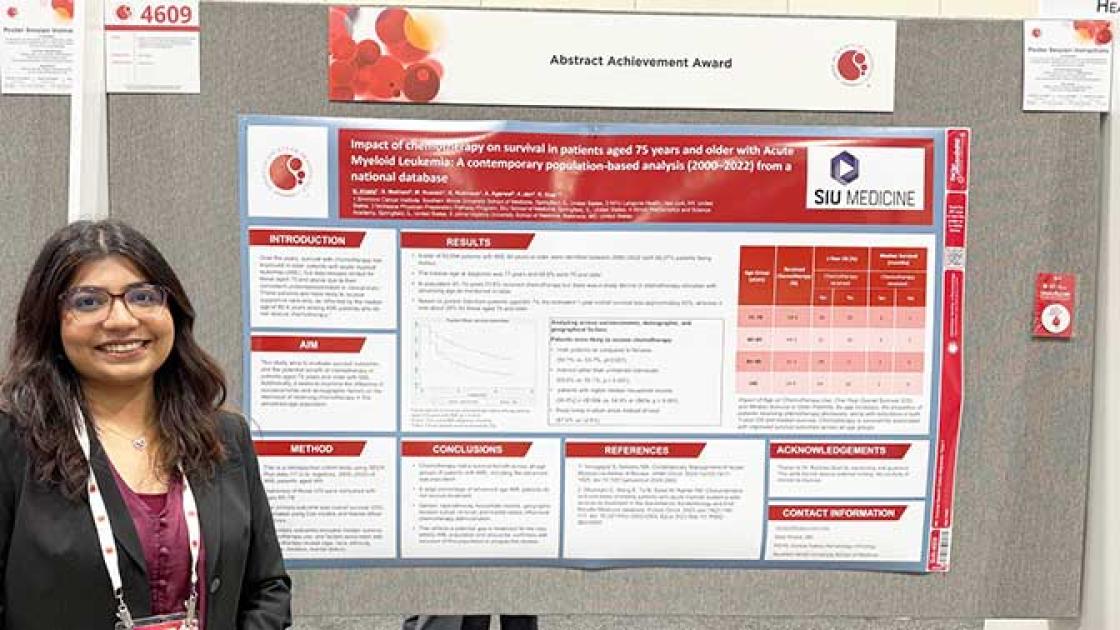
Baby med school on steroids leads to hometown health care
For many aspiring medical professionals, the journey to becoming a physician can feel like navigating a complex maze.
For Evan Beilfuss and Maci Burgener, their paths converged at SIU School of Medicine, where a unique combination of master's-level preparation and rural-focused training has them poised to deliver advanced health care.
The first step for both students was the Biomedical Sciences Master’s (BMS) Program at SIU. This one-year, non-thesis master’s degree enhances students’ competitiveness for medical school through rigorous coursework and personalized application support.
“The BMS Program is baby med school on steroids,” Burgener said with a laugh, describing her year in the program.
For both Burgener and Beilfuss, the BMS non-thesis master’s program offered a vital bridge between undergraduate studies and the demanding pace of medical school. Designed to mimic, and even accelerate, the intensity of a first-year medical curriculum, the program equipped them with both the academic foundation and the personal resilience needed to thrive in med school.
Building a foundation of confidence
For Burgener, the decision regarding applying for medical school came at a pivotal time. The COVID-19 pandemic had disrupted her undergraduate years at the University of Illinois at Urbana-Champaign. Graduating early and learning through the pandemic left her uncertain about jumping straight into medical school. “Becoming a doctor had always been my dream,” she said, “but I didn’t feel ready.”
A friend introduced her to SIU’s BMS Program, and it immediately clicked. “It seemed like exactly what I needed to strengthen my academic foundation and professional skills before applying to medical school,” Burgener said.
Beilfuss’ journey was different. After completing all four years of his undergraduate degree, he realized he needed more preparation before facing the MCAT and medical school applications.
“I wasn’t as prepared as I wanted to be,” he said. “When I discovered the BMS Program and saw how it mirrored the first year of med school, I knew it was the right move. Every class I took was focused on human anatomy, human physiology and pharmacology. It was incredible to take courses that felt so directly relevant to practicing medicine, which wasn't always the case with basic sciences I studied as an undergraduate.”
Both students highlighted the personalized attention they received from Dr. Anneke Metz, the program’s director. “She was so eager to get to know us and our cohort,” Burgener recalled. This individualized support is a hallmark of the BMS Program, which offers tailored advising, MCAT or DAT preparation and application assistance.
Burgener tackled the program in just one year, completing 15 graduate-level credit hours per semester. “Looking back, it was a wild ride,” she said. “But that experience made my first year of medical school a breeze. The academic rigor of BMS, combined with MCAT prep, gave me a competitive edge.”
Beilfuss found the team-based approach invaluable. “That first year, you really have to navigate everything together. It forces you to rethink how you learn and reinforce material,” he said. In his second year in the BMS program, he stayed on as a teaching assistant, leading cadaver dissections in the advanced anatomy lab. “Learning how to teach and communicate using medical terms put me way ahead in the first year of the Lincoln Scholars Program.”
Rural roots – choosing the Lincoln Scholars Program
Their success with the BMS Program directly led both Burgener and Beilfuss to their next step at SIU – the Lincoln Scholars Program (LSP). For Burgener, the decision was rooted in her rural upbringing in Olney, Illinois. “Since I knew I wanted to be a physician, I’ve envisioned myself practicing rural medicine,” she said. “The Lincoln Scholars Program's mission of training in southern Illinois and staying connected with these communities was a perfect fit.”
Beilfuss, while initially having some reservations about the newer LSP program, was drawn to the small class size and early clinical integration. Students begin seeing patients within weeks of starting the program, working with an interdisciplinary team and a rural physician mentor throughout their training.
“There’s always someone you can reach out to. It feels like a home, it feels like a family in the best sense of the word,” Beilfuss said.
This emphasis on longitudinal care and direct engagement with rural communities sets the LSP apart. The program also fosters a collaborative learning environment, with Lincoln Scholars training alongside physician assistants. This unique approach ensures students understand the specific health care needs and challenges of rural areas.
“Our program is strongly rooted in service,” Beilfuss continued, pointing to the willingness of local physicians to mentor students and encourage them to explore specialties. “They understand that there’s a shortage, and they want to continue serving the community even after they retire. You get a lot of physicians and other providers that will actively encourage you to come in and experience their specialty.”
Advice for future medical students
Both students encourage prospective pre-medical or pre-dental students to take a serious look at the BMS program. “If you’re unsure about medical/dental school or want to strengthen your application, BMS is a fantastic choice,” Burgener said. “It’s intense, but it sets you up for success.”
Beilfuss agrees, “BMS gave me the tools, the confidence, and the connections to succeed in med school. It’s the best decision I made for my career.”
With small class sizes, faculty who know your name and a curriculum mirroring the first year of medical school, the BMS program offers a strong first step for aspiring health care professionals.
As Burgener puts it, “It’s baby med school on steroids—and it works.”
The journey for Beilfuss and Burgener, from the focused preparation of the BMS program to the community-centered training of the Lincoln Scholars Program, exemplifies SIU School of Medicine’s commitment to growing its own. They are not just learning medicine; they are becoming part of the fabric of central and southern Illinois, ready to deliver compassionate, high-quality health care where it is needed most.



